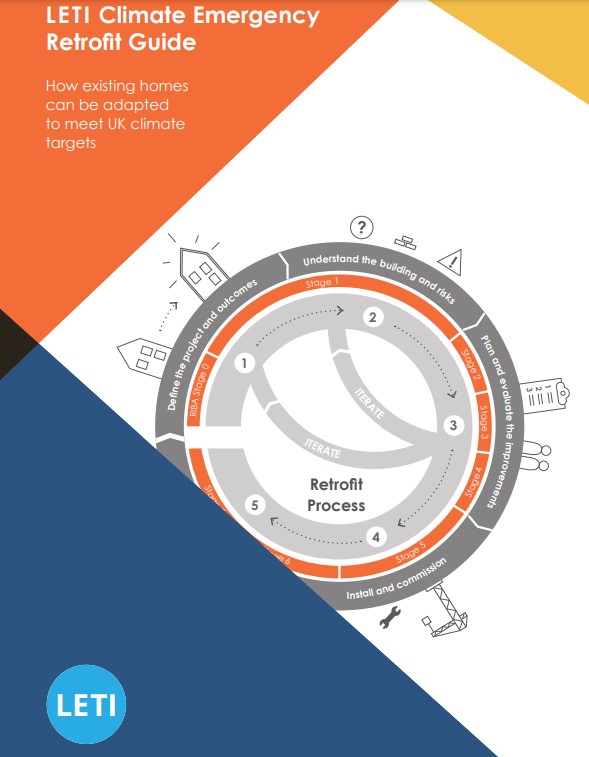LETI publishes Climate Emergency Retrofit Guide

|
In October 2021, more than 100 construction professionals representing leading architecture and engineering firms, academia and NGOs joined together for the publication of the London Energy Transformation Initiative (LETI) Climate Emergency Retrofit Guide, which aims to provide a blueprint for how we can retrofit our homes to support the UK's net zero targets.
The publication provides guidance on how those targets can be achieved through energy efficiency measures and heat pumps. LETI defines retrofit specifications for four primary housing types (mid-terrace, semi-detached, detached and apartment) and provides advice on how to meet those specifications.
It is widely accepted that retrofitting existing buildings is critical for the UK to be zero carbon by 2050. Around 18% of annual national CO2 emissions come from existing homes.
LETI has gathered more than 100 retrofit experts from across the construction industry to agree on how to retrofit existing domestic buildings so that the buildings meet our future needs.
The Climate Emergency Retrofit Guide sets out what good retrofit looks like for existing homes. LETI defines space heating and energy use requirements – targeting a 60% to 80% reduction in total energy consumption for the average UK home. These targets have been determined through a combination of practical experience and understanding of what measures are realistically achievable, informed by a national housing stock model, to examine issues such as renewable energy provision and grid capacity, said LETI.
The guide points out the potential risks of poor retrofit and advises on how to deliver efficient, resilient and healthy homes. LETI stated that good retrofit can bring multiple environment, social and economic benefits but this requires a whole-house approach and a shift from fossil fuels to electricity for heating and hot water.
Antonia Khayatt from LETI said, "Retrofitting buildings to be more energy efficient doesn't just reduce carbon emissions and energy bills. It can improve comfort and health, create jobs and reduce fuel poverty. It can also reduce the demand on and costs to the UK's energy infrastructure. This guide explains these issues and shows how taking the LETI approach to retrofit will help us enjoy these broader benefits."
This publication follows LETI's Climate Emergency Design Guide in 2020, which outlined requirements for new buildings to ensure climate change targets are met.
The cross-industry guide, published by LETI, is backed by professional institutions and organisations including the Royal Institute of British Architects (RIBA), the UK Green Building Council (UKGBC) and the Better Building Partnership (BBP). The guide is available to download for free.
This article originally appeared on the CIAT website under the title, 'LETI publish blueprint for retrofitting UK's homes to meet climate emergency'. It was published on 21 October 2021.
--CIAT
[edit] Related articles on Designing Buildings
Featured articles and news
A case study and a warning to would-be developers
Creating four dwellings for people to come home to... after half a century of doing this job, why, oh why, is it so difficult?
Reform of the fire engineering profession
Fire Engineers Advisory Panel: Authoritative Statement, reactions and next steps.
Restoration and renewal of the Palace of Westminster
A complex project of cultural significance from full decant to EMI, opportunities and a potential a way forward.
Apprenticeships and the responsibility we share
Perspectives from the CIOB President as National Apprentice Week comes to a close.
The first line of defence against rain, wind and snow.
Building Safety recap January, 2026
What we missed at the end of last year, and at the start of this...
National Apprenticeship Week 2026, 9-15 Feb
Shining a light on the positive impacts for businesses, their apprentices and the wider economy alike.
Applications and benefits of acoustic flooring
From commercial to retail.
From solid to sprung and ribbed to raised.
Strengthening industry collaboration in Hong Kong
Hong Kong Institute of Construction and The Chartered Institute of Building sign Memorandum of Understanding.
A detailed description from the experts at Cornish Lime.
IHBC planning for growth with corporate plan development
Grow with the Institute by volunteering and CP25 consultation.
Connecting ambition and action for designers and specifiers.
Electrical skills gap deepens as apprenticeship starts fall despite surging demand says ECA.
Built environment bodies deepen joint action on EDI
B.E.Inclusive initiative agree next phase of joint equity, diversity and inclusion (EDI) action plan.
Recognising culture as key to sustainable economic growth
Creative UK Provocation paper: Culture as Growth Infrastructure.
Futurebuild and UK Construction Week London Unite
Creating the UK’s Built Environment Super Event and over 25 other key partnerships.
Welsh and Scottish 2026 elections
Manifestos for the built environment for upcoming same May day elections.
Advancing BIM education with a competency framework
“We don’t need people who can just draw in 3D. We need people who can think in data.”

























